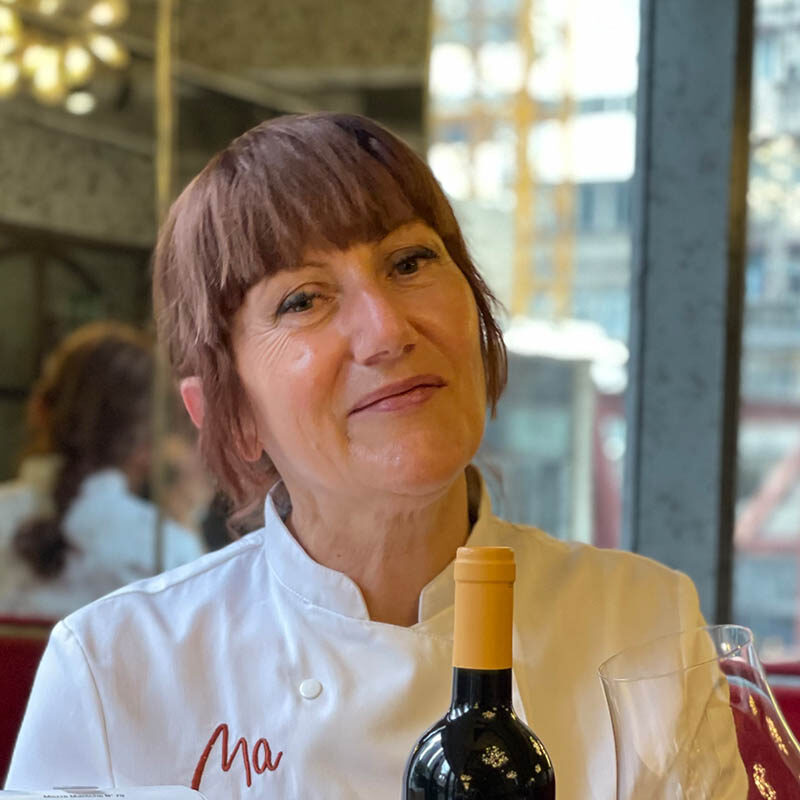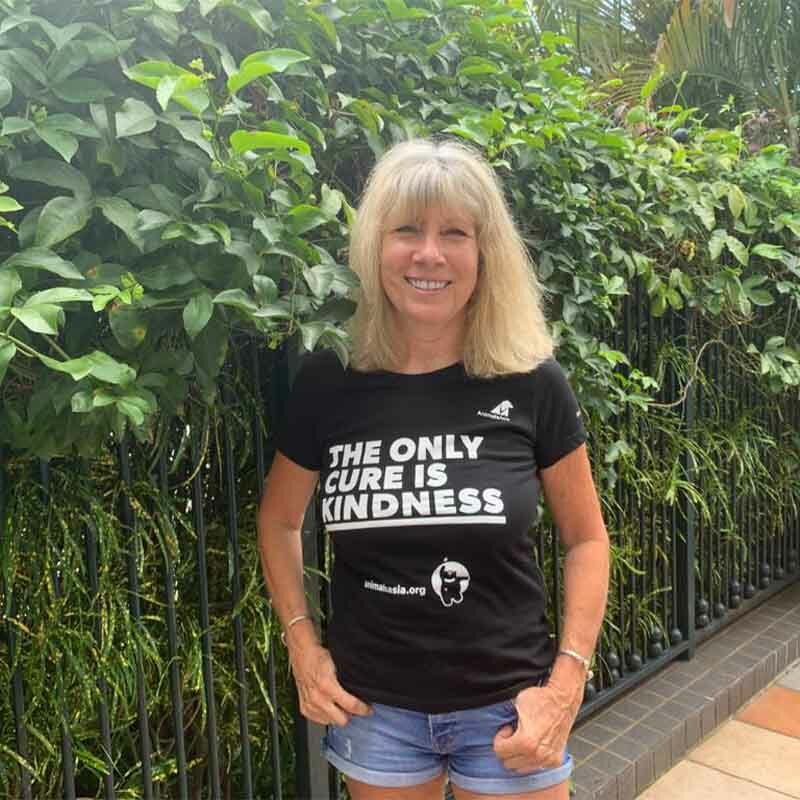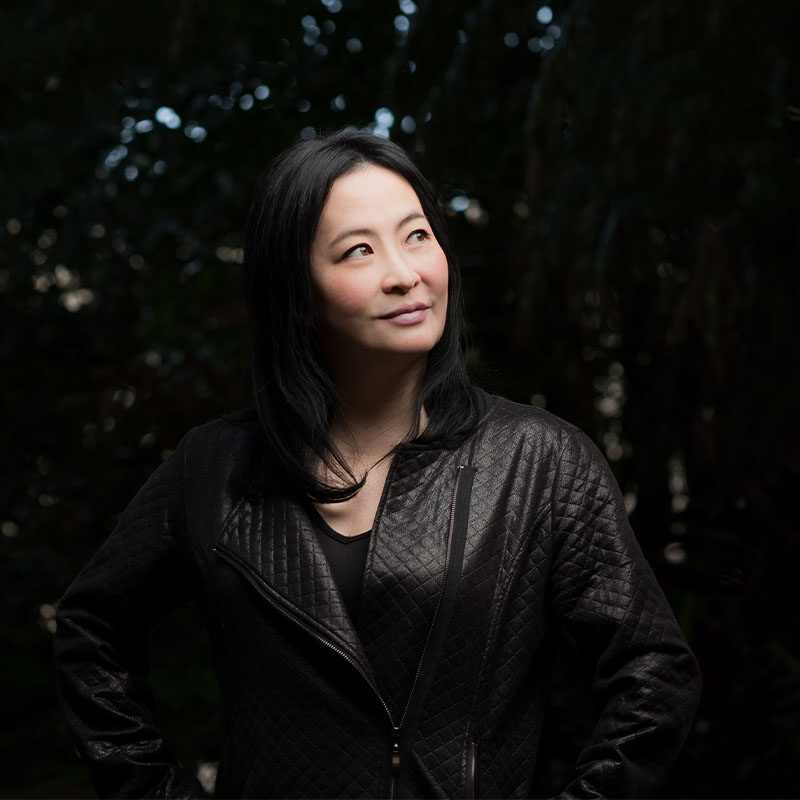
Jill Robinson: Championing Animal Rights in Asia
Traditional medicine (TM) in Asia is infamous for using animal parts as supposed cures for ailments: pangolin scales, rhino horns, tiger bones, the list goes on and on. The demand for these often questionable medicines has been devastating to wildlife populations, contributing to declines of 90% or more. Worse still, some TM products are extracted from animals while they are still alive, with one of the cruellest examples being bear bile.
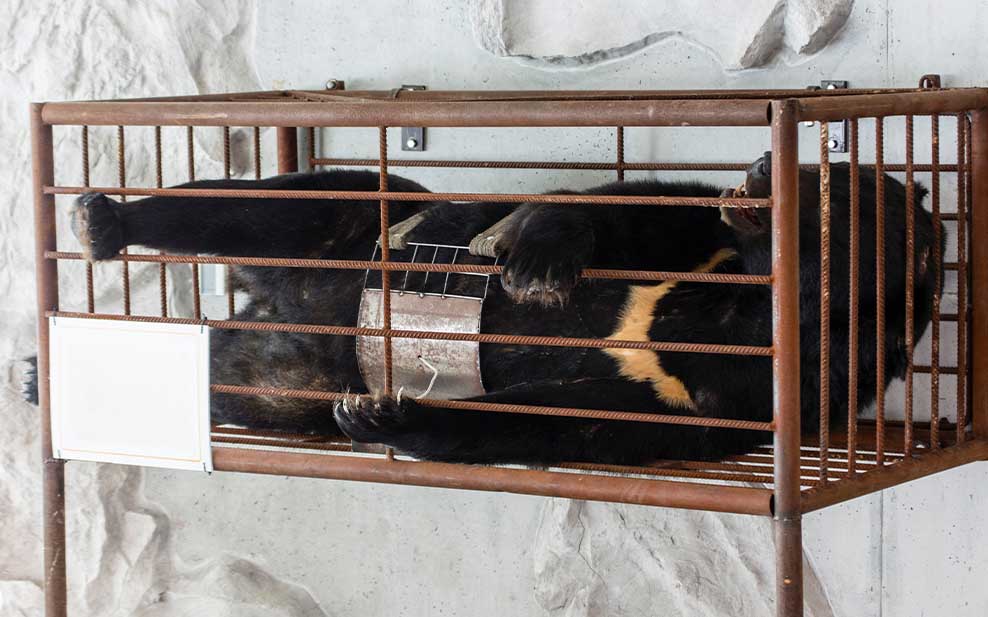
Bear bile contains ursodeoxycholic acid (UDCA), which is used (effectively) to treat numerous conditions and in nature, is only produced in useful amounts by bears. Though traditionally obtained by hunting, nowadays it is extracted mainly from live Asiatic black bears using methods akin to Medieval torture. Across Eastern Asia, thousands of bears are crammed into tiny cages with needles, catheters or rubber pipes forcibly inserted into their gallbladders, typically without veterinary expertise. Kept in filthy conditions and given little food or water, the bears can suffer their entire lives in agony.
For conservationists and animal rights activists, one of the most frustrating things about TM is how resistant it has been to reform, with the trade in many wildlife products showing no signs of slowing. Happily, the end of the bear bile industry at least may now finally be in sight, thanks to the efforts of one woman: Jill Robinson.
Originally from England, Jill was already a lifelong animal lover when she moved to Hong Kong in the mid-1980s. Although she did not seriously envision herself working in animal welfare back then, fast forward to today and she is now a leading figure in the field with an impressive list of accomplishments, including founding her own NGO and the first animal therapy programme in Asia.
She is best known, however, for her work with the suffering bears of the bear bile industry. From her first encounter with one such victim in 1993, Jill has spent decades orchestrating the rescue of bears and the closure of bile farms. Now, because of this, not only are hundreds of bears living happier, pain-free lives, but the industry that exploited them so mercilessly appears to be on its last legs.
In this WELL, WHO? Feature, we share Jill’s incredible story, from her early start working with animals in England to her ground-breaking achievements in Asia. What is revealed is someone driven by an immutable desire to not only do right by our fellow creatures, but also to reconfigure our own relationship with them for a more harmonious co-existence.
Puppy Love
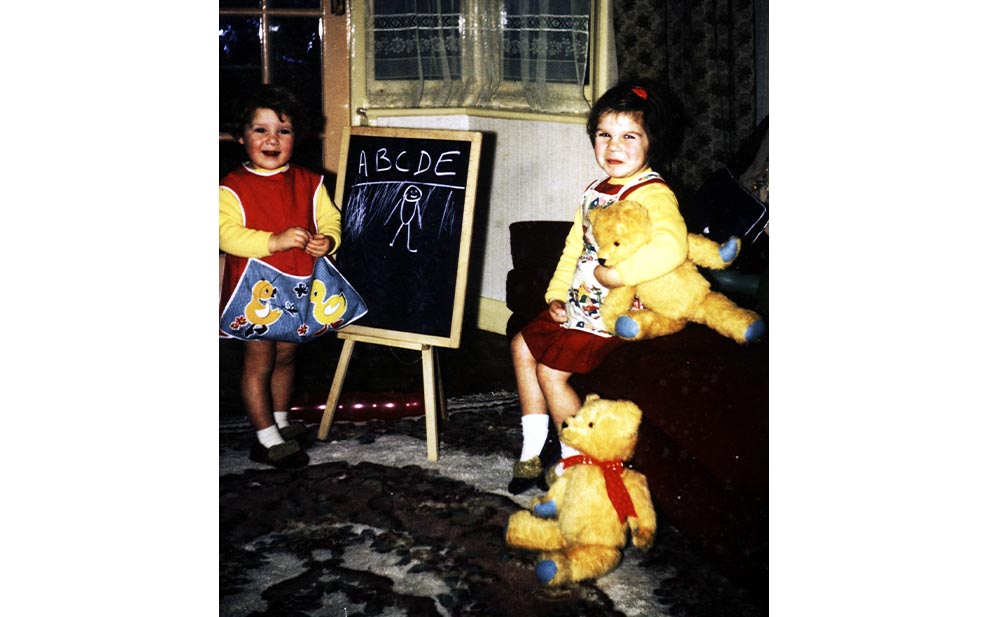
Jill was born in Nottingham to a father who was a squadron leader with the Royal Air Force. After her mother’s sudden death when she was a year old, she and her younger sister had a somewhat nomadic childhood, living alternately with their father and with their aunt and uncle. While her childhood was loving, moving from home to home was nonetheless challenging and her father’s frequent work-related absences made it hard to form a connection with him.
Whatever she may have lacked however, Jill made up for with an intense, innate passion for animals, which she feels may have stemmed from the difficulties of those early years. “I felt very safe in the company of animals. I felt that one could be oneself and there was nothing to prove” she reminiscences fondly. “I would almost get run over in my eagerness to go and stroke a dog or a cat in a garden across the road.” Undeterred by a family ban on pets, she volunteered to walk her neighbours’ dogs and worked part-time in animal shelters and veterinary clinics in her free time. These experiences not only strengthened her passion for animals, but also taught her just how cruel we humans can be to them sometimes.
“I remember looking at a picture of a vivisection for the first time and being absolutely horrified” she recalls with disgust. “I think that left a really indelible mark inside me in terms of wanting to learn more about animal welfare.” To that end, she became a supporter of the International Fund for Animal Welfare (IFAW) and took part in fundraising activities for them.
After leaving school at 18, Jill pursued a career in media, working first as a production secretary with the BBC and then moving into a similar role with Thames Television. Later, she married a pilot who got a job with Cathay Pacific, which led to them moving to Hong Kong in 1985. Despite having never been before, Jill felt an instant affinity with the city as soon as she arrived.
“The second I stepped off the plane, I [felt] that I’d almost come home. I absolutely loved everything about Hong Kong. I loved the food, I loved the people.”
As much as she loved living in Hong Kong however, finding a job proved to be more challenging. Her original vision to further her career in television and radio led to uninspiring interviews and she felt forced to think again. For some time, Jill was left unsure of what to do with her new life.
Luckily, a chance encounter would soon set her on the career of her dreams.
Dog’s Best Friend
One day, whilst standing on the balcony of her house, Jill spotted a man walking his cat on a nearby beach and decided to join him. Upon discovering that the man was David Dawson, the representative for the Asian branch of IFAW, she offered her help to the charity as a volunteer or assistant. As luck would have it, they were able to offer her a paid position.
“[It] brought me full circle, because I’d supported them back in the UK” she says.
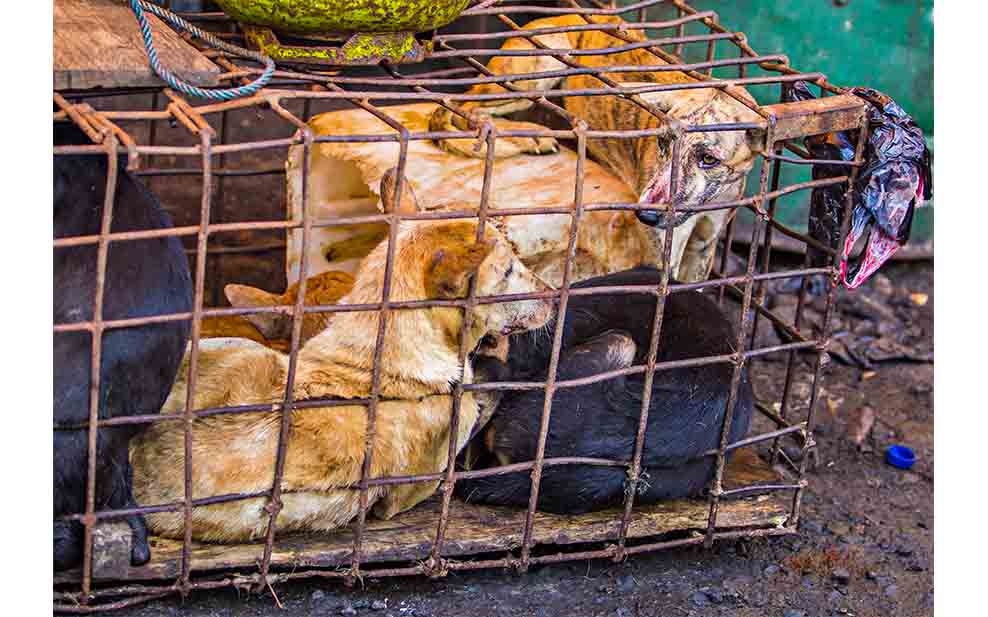
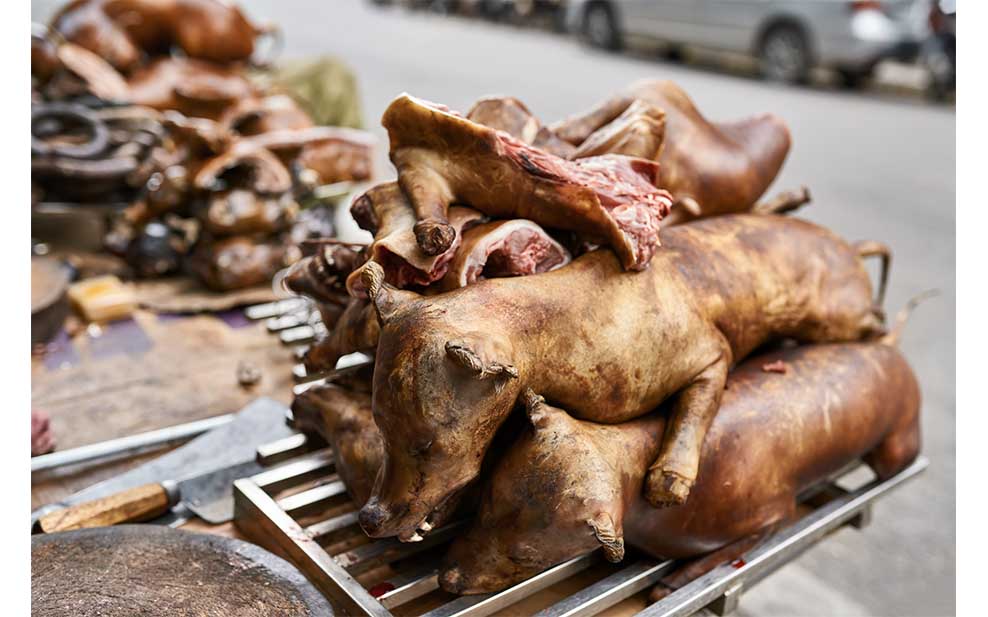
Within her role at IFAW, Jill toured live animal markets in China, South Korea and the Philippines as an undercover agent, where she was deeply disturbed by the sight of so many cats and dogs being slaughtered for meat. Equally distressing was seeing a lot of stray dogs whose owners had bought them on a whim, only to later abandon them. To her, it spoke to a real lack of concern and empathy and prompted thoughts of how she could change this.
“[I was] just thinking there has to be another way” she says. “If people embraced dogs and recognised the benefits that they could give society, perhaps [they] would slowly change their minds about eating them.”
Eventually in 1991, she had the unprecedented idea of starting an animal therapy programme in Hong Kong, in which contact with live animals is used to alleviate the suffering of sick or disabled people. “It’s a programme that allows people to have the benefit of the unconditional love of a dog” she explains. Christening her programme ‘Doctor Dog’, she pitched the idea to several hospitals and disabled centres, but was repeatedly rejected. Finally, the matron of the Duchess of Kent Children’s Hospital agreed to give her a chance, granting Jill one hour in the hospital garden with her golden retriever, Max, to prove that Doctor Dog could be a success.
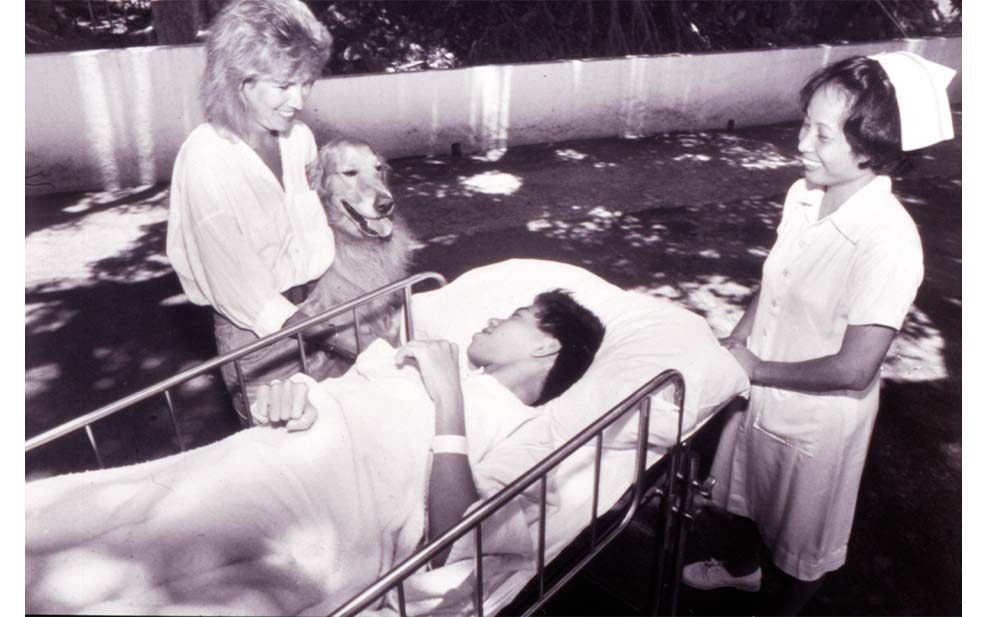
Much to the amazement of the sceptical staff, the response of the children who were brought out to interact with Max was overwhelmingly positive. “Kids were wheeled out in their wheelchairs, in their beds; some of them came out on crutches. And they just loved him. They absolutely loved him”. After the story made the South China Morning Post, Jill was inundated with requests from hospitals and volunteers wanting to take part in her programme. “My phone just didn’t stop ringing” she says.
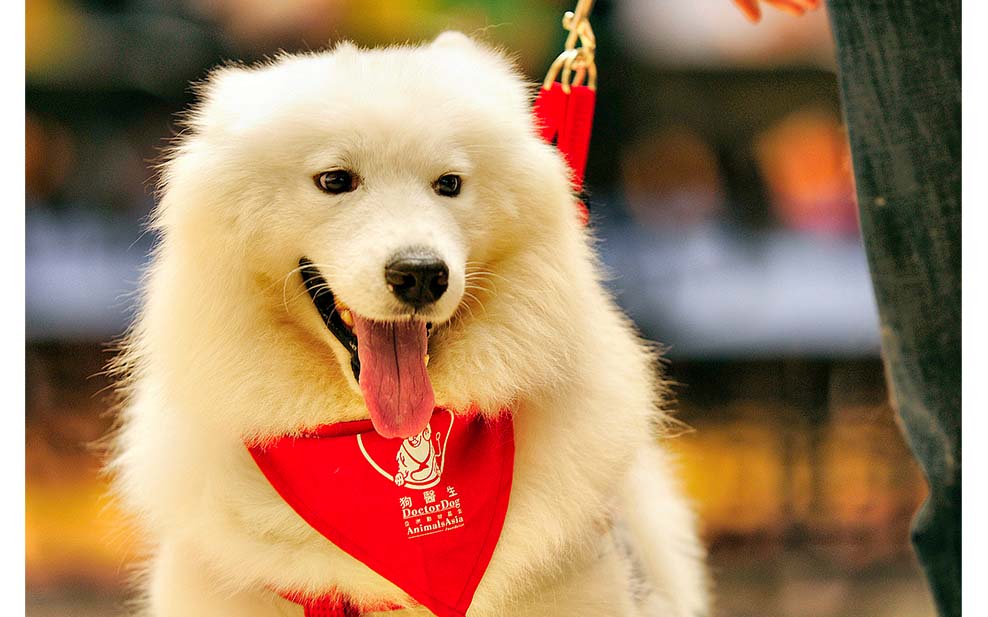
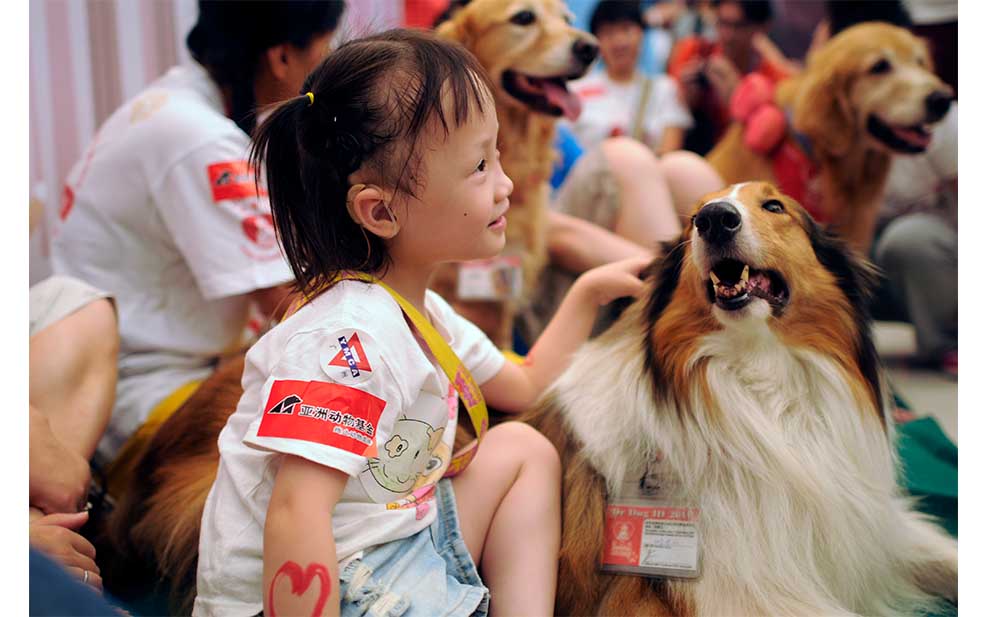
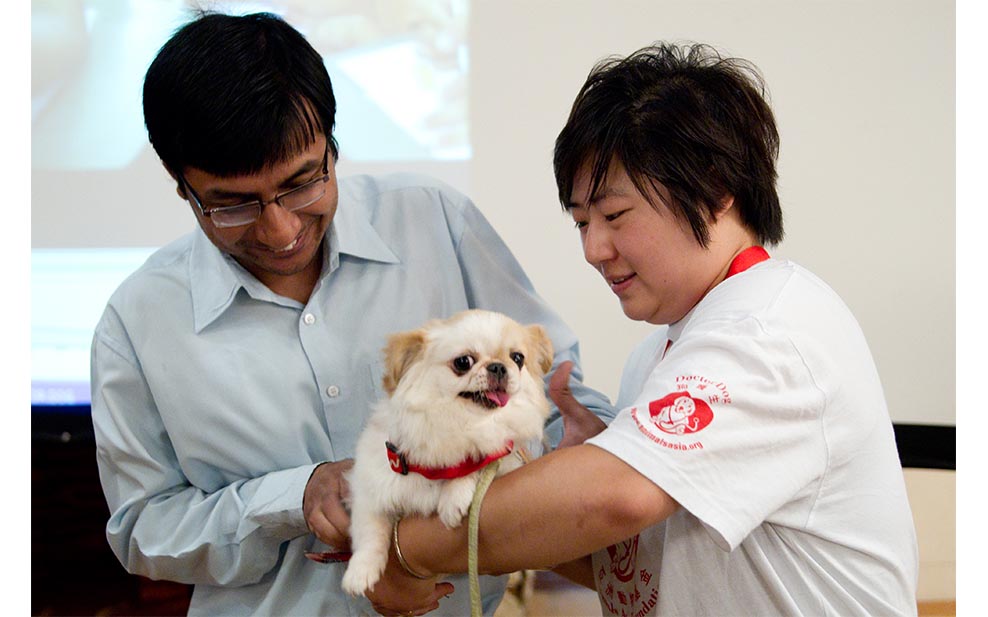
Today, Doctor Dog operates in seven Asian countries including India, Malaysia, China and Japan. In China alone, 2,918 people benefitted from its services in 2021 and hospitals have even published research papers on its positive effects. Doctor Dog’s success has also generated a sister programme, Professor Paws, in which schoolchildren are taught how to interact with dogs properly and enjoyably. As a result of all of this, local attitudes towards these animals have undergone a marked improvement.
“Over these last 20-30 years, we’ve seen great change in China. We’ve seen people embracing being in the company of dogs and indeed cats as well” Jill remarks.
A (Literal) Touch of Destiny
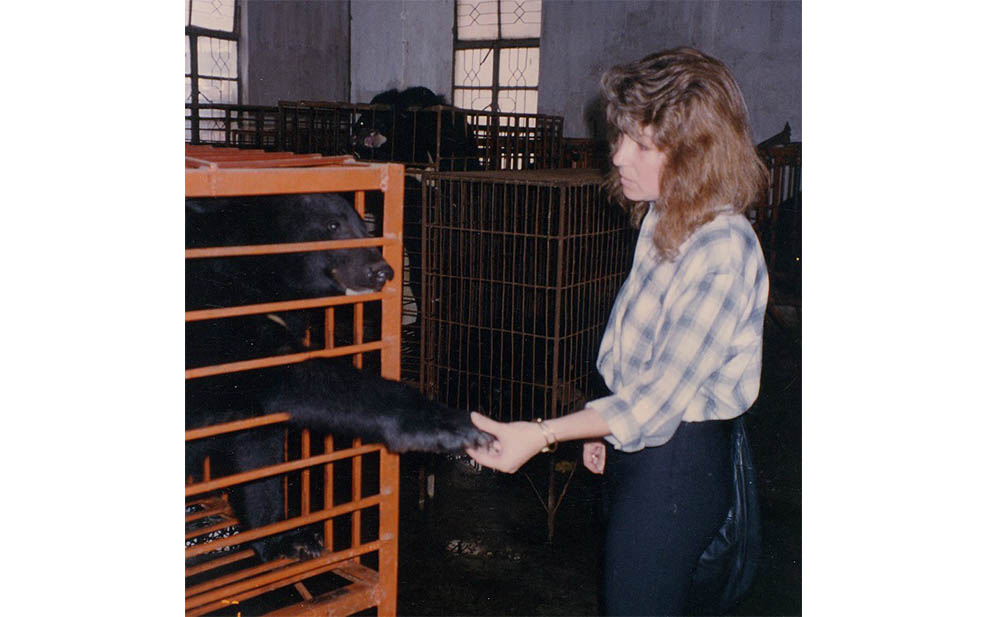
In 1993, a journalist friend of Jill’s contacted her, urging her to investigate a bear bile farm in Southern China, which back then was offering tours of its facilities. Jill and some friends booked one for themselves then, once the farmer’s back was turned, sneaked off into the basement, where they made a horrifying discovery.
“That’s where we saw the bears in cages with the most atrocious wounds to their bodies” says Jill sombrely. “From that second on, I realised that there was something so unjustified about this industry.” At that moment, Jill had a life affirming experience when one of the bears reached through the bars of her cage and touched her shoulder with her paw. Without thinking twice, Jill turned around and gently took the proffered paw in her hands. “She didn’t hurt me. She just squeezed my fingers and I just had the feeling that I’d never see her again.”
Sadly, Jill indeed never saw that bear again. But later that year, armed with the insights she had gained, IFAW managed to rescue a small number of bears from a different Chinese farm and build a sanctuary for them. Inspired by this, Jill decided to scale things up further and in 1998, co-founded her own animal welfare NGO: Animals Asia.
“We really went ahead after [seeing] that shocking example of what was happening to the bears. It was the one thing that influenced us” she recalls.
Animals Asia has three main goals: 1) to end bear bile farming, 2) to end the cat and dog meat trade and 3) to improve the welfare of captive animals in general. Just two years after its founding, the NGO got off to a good start on its first objective when, with the help of the Chinese government, it was able to shut down an illegal bile farm and rescue 60 bears. In that same year, it also signed an agreement with the government to rescue 500 bears, a goal that it has more than managed to achieve since then.
What does Animals Asia do?
Bear Rescues
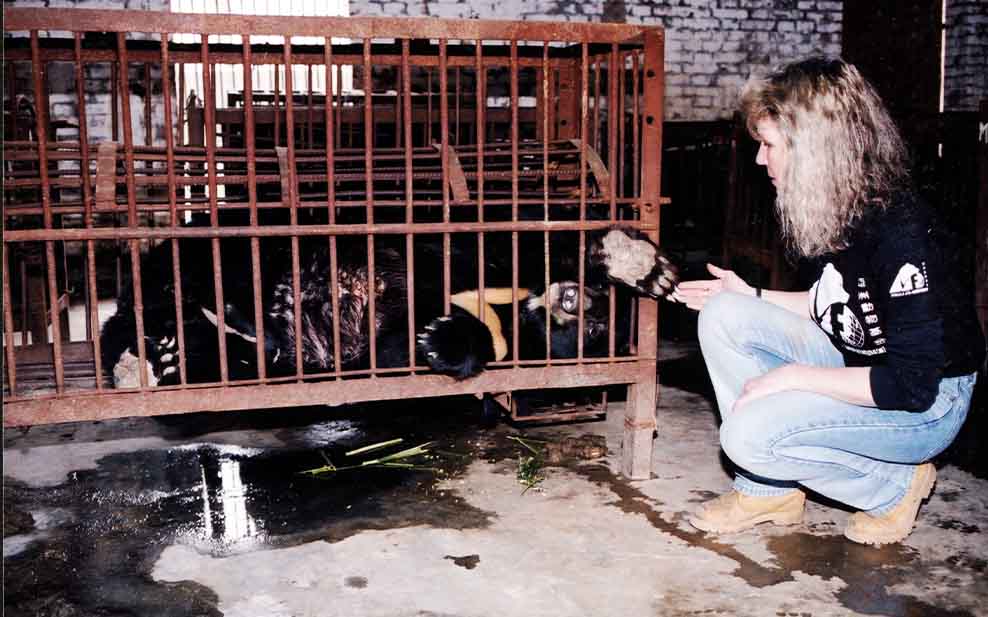
Animals Asia’s work tackling the bear bile trade occurs mainly in China and Vietnam, with one bear sanctuary in each country.
A typical rescue begins with a phone call about a bile farm that is closing and the confiscated bears that need collecting. Once the animals arrive at a sanctuary, they are then given urgent treatment for a litany of health problems. Having been physically abused for years, most arrive with life-threatening infections and liver cancers – one of Jill’s first rescued bears had a tumour the size of a watermelon. Others may have mobility and walking difficulties from never stepping outside their cages or broken teeth from chewing on the bars in futile escape attempts. Tragically, some are in such bad shape that they don’t even make it to the sanctuary.
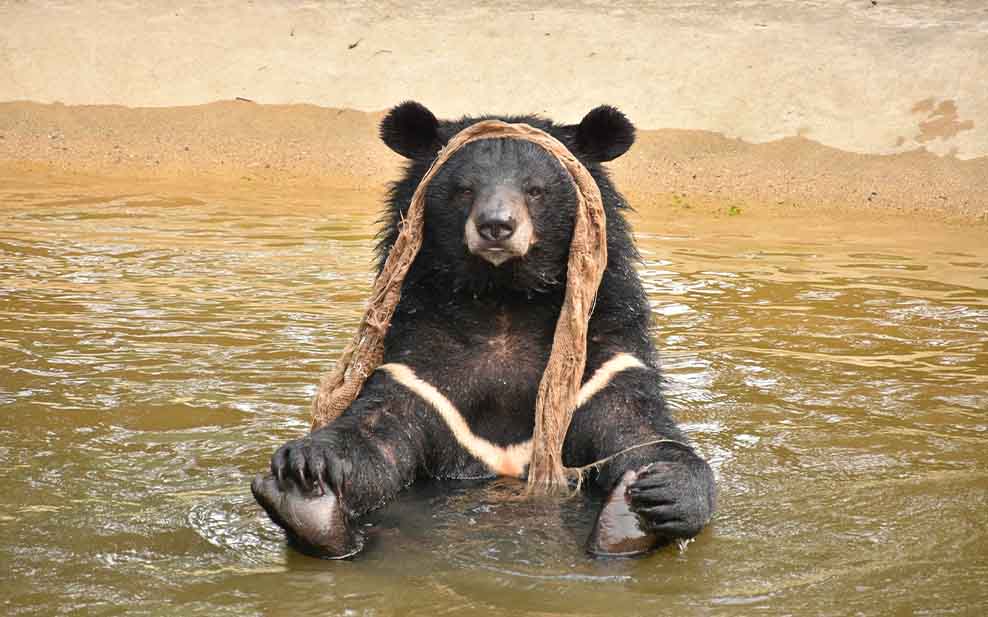
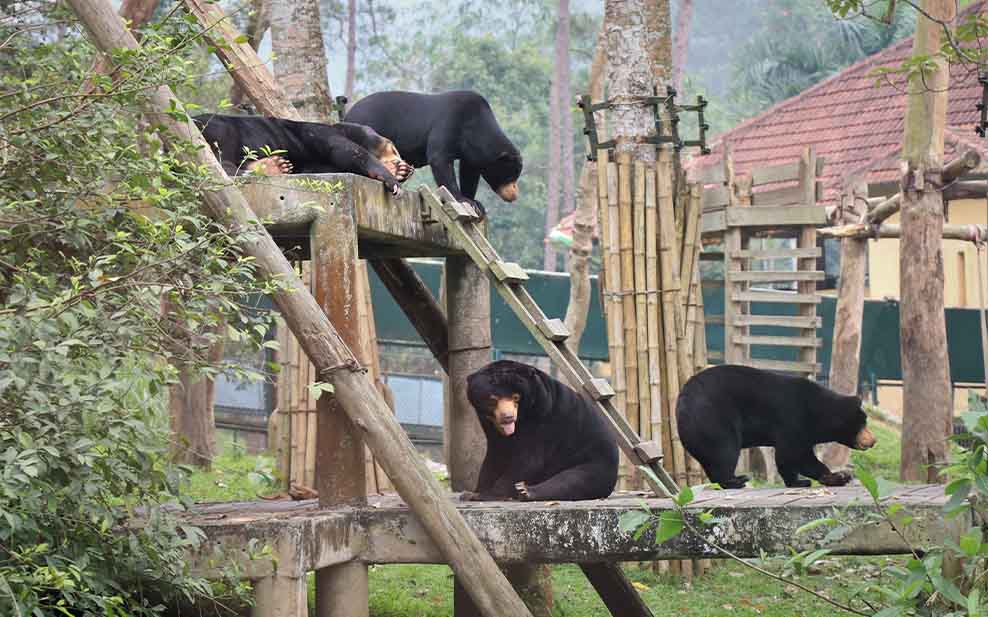
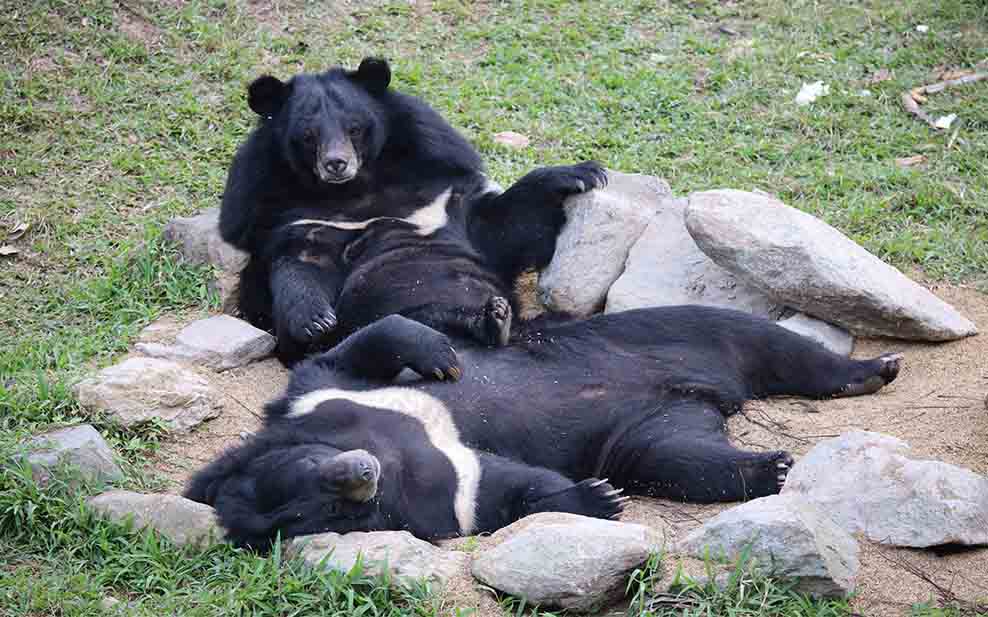
For those that do survive however, a life of long-deserved happiness awaits them. Once they are given the all clear from the vets, they are moved to permanent outdoor enclosures where they can splash in their own pools, stretch their limbs on climbing frames and socialise with other bears for the first time. To encourage natural foraging behaviours, they are given food stored inside bamboo feeders or skewered on branches. For animals that have known nothing but torture their whole lives, it’s like going to heaven without dying.
Since its founding, Animals Asia has exceeded its initial goal for bear rescues, having to-date rescued 669 bears in China and Vietnam.
Bear Outreach
Of course, performing these rescues would be difficult, even impossible, without the help and support of local governments and people. And unless the demand for bear bile decreases, they will only ever be a band aid solution. This is where Animals Asia’s outreach and lobbying work comes in.
One reason for the persistence of bear bile farming is because many consumers believe that it takes pressure off wild bear populations and allows them to recover. But in fact, many farms supplement their captive animals with wild ones or sell bile from wild bears killed for their gallbladders. Moreover, a legal loophole in Vietnam allows farmers to keep bears if they are registered as ‘pets’, which many exploit to extract bile from them.
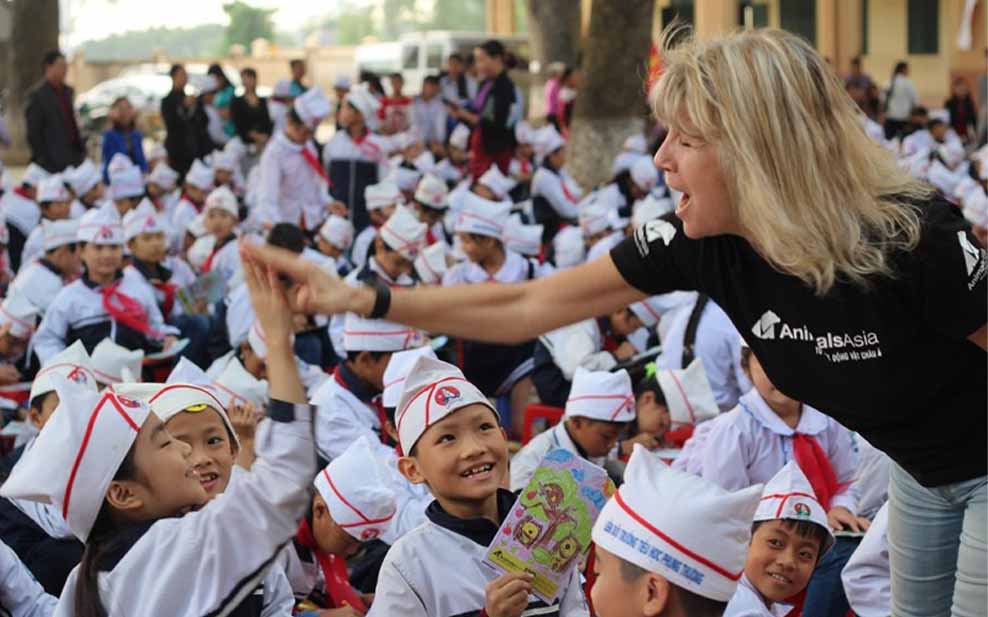
Instead of guilt-tripping people into renouncing bear bile however, Animals Asia takes a more culturally tactful approach: acknowledging the legitimate medicinal benefits of the UDCA in bear bile whilst working with TM practitioners to get them to stop selling it. Together, they run monthly talks at clinics where people can learn about (and be prescribed) herbal alternatives and are encouraged to share their newfound knowledge with their communities. Animals Asia also runs more conventional education programmes on the impacts of bear bile farming and works with schools in Vietnam to grow herbs for alternative remedies. “We’ve got many, many of those gardens across the country now” says Jill.
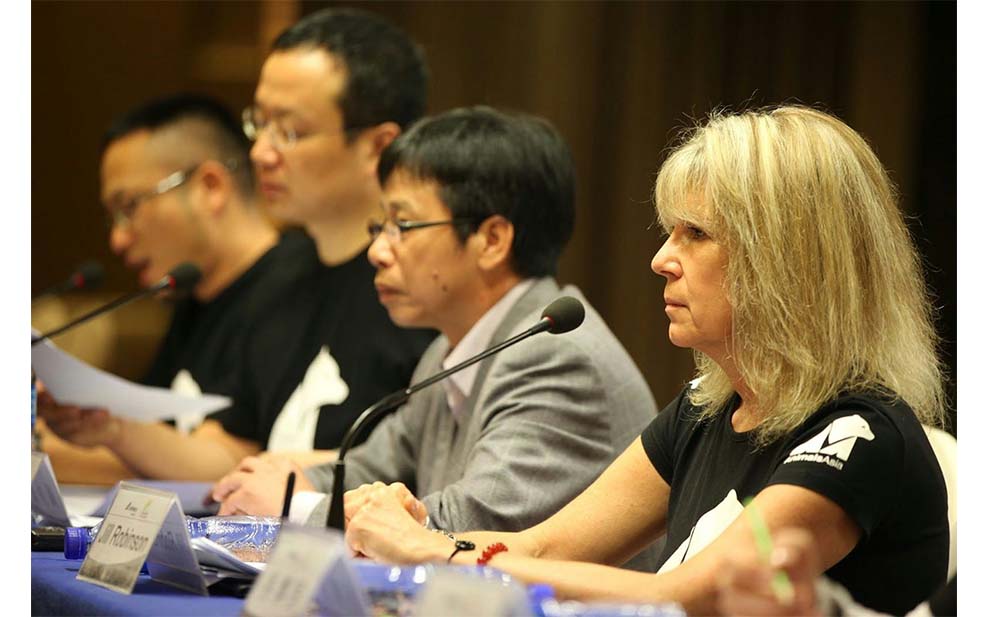
The effect of this education has been profound. Surveys have recorded a significant drop in consumer demand for bear bile, as well as a shift in public opinion against it. Governments too have taken action against the industry. “In Vietnam, under the leadership of our Vietnam Director, Dr Tuan Bendixsen, we made an agreement with them to stop prescribing and selling bear bile by the year 2020. They kept their promise and that’s no longer being sold in Vietnam legally” Jill proudly reports. Taking things further, the Vietnamese government now aims to close all of the country’s bile farms by 2026, has implemented penalties for extracting and farming bear bile and is actively collaborating with Animals Asia in their education programmes.
However, Animals Asia also tries to help those whose livelihoods their work is impacting to transition out of bear bile farming. In China, where the practice is still legal and bears are confiscated from illegal farms, Animals Asia compensates farmers for their losses. Meanwhile, Vietnamese farmers are put on notice that the industry is being made illegal and are encouraged to join programmes aiding bear welfare.
“We don’t want people walking out of an industry with their livelihoods destroyed. That’s not right either” Jill states. “I think when bear farming ends in Vietnam, we can very proud that we’ve not just helped the bears, but we’ve also helped people across the country to join us in a kind programme that shows that our drive to utilise animals as a resource should be [reconsidered].”
Cats and Dogs
As well as Doctor Dog and Professor Paws, Animals Asia also takes more direct measures to tackle the cat and dog meat trade.
In China, investigators go undercover at live animal markets to document the extent of the trade and the condition of the animals. “They keep doing that so that they can show the government that there is a black industry. This is really an illegal underground trade” Jill explains. As with the bears, Animals Asia runs educational programmes to show consumers the ugly truths behind the trade, like the fact that many of the cats and dogs on sale are actually stolen family pets. “I think a lot of people who eat dogs naturally assume that there are dog farms out there. But there aren’t, there’s hardly any” says Jill. “These dogs are stolen from people’s loving family homes.”
Combined with Doctor Dog and Professor Paws, this work has contributed to the change in attitudes towards cats and dogs in China noted earlier. It has also resulted in these animals recently being taken off the livestock list. “It still is a work in progress. But I have to say that I think we’ve been doing something right” Jill says proudly.
Moving Forward, One Paw at a Time
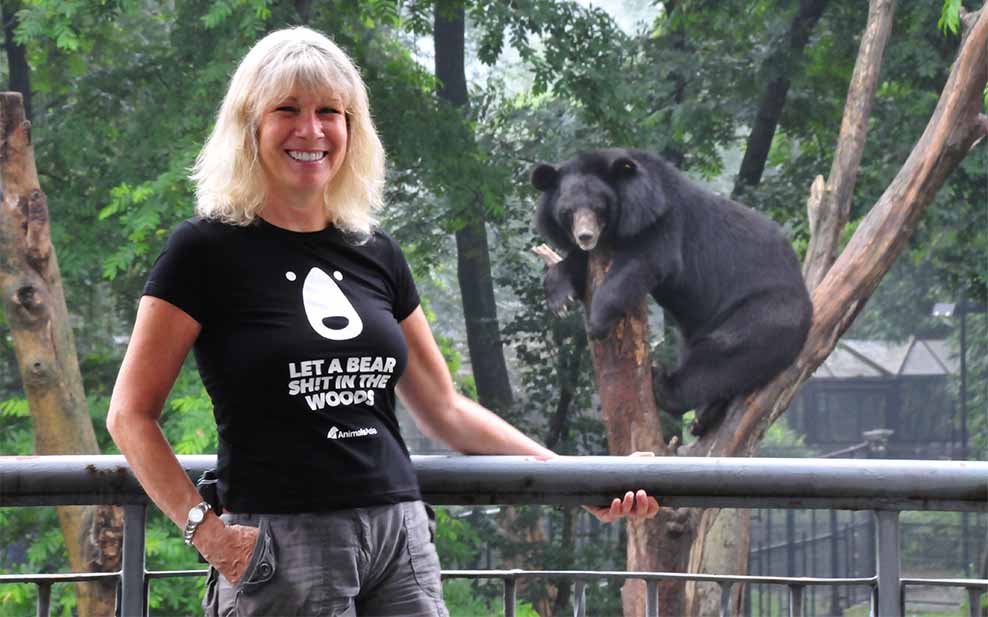
For Jill, the past 20+ years has been a long, sometimes emotionally fraught journey, but also an immensely rewarding one. After all, there are few NGOs that have brought down any part of the wildlife trade as much as hers has. These achievements are all the more impressive given how alien the core ideology behind them once was in Asia.
“I just think we started the ripples in the countries where we work. Animal welfare wasn’t even a word when we started in China, but now it’s very frequently used.”

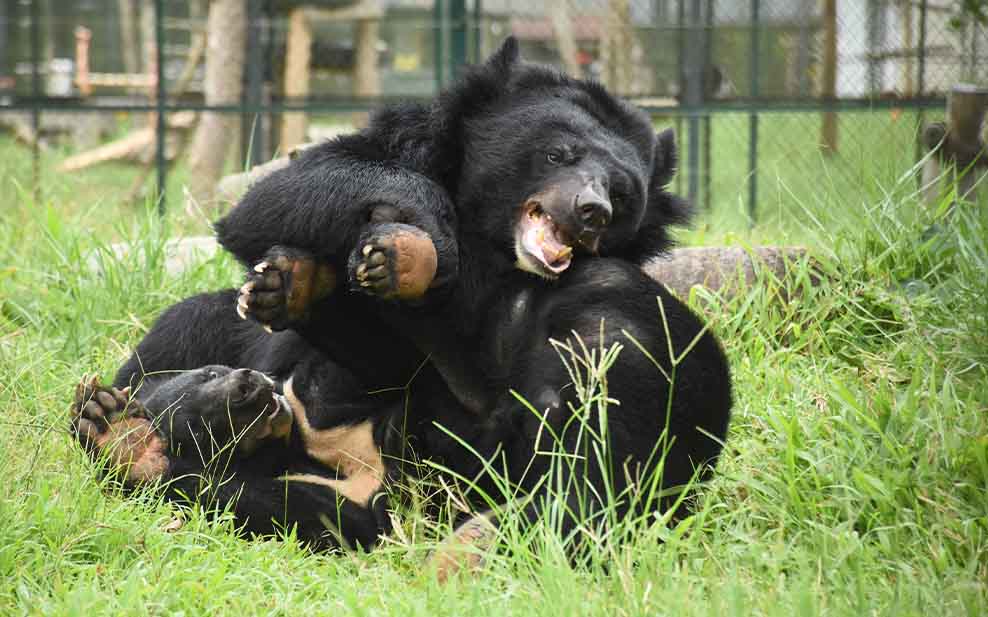
Perhaps the most gratifying thing has been seeing the transformation of the bears from frightened, traumatised victims to happy, carefree animals finally enjoying their lives. “It’s night and day” she says of the bears before and after rescue. “They start to become interested in life itself. […] It’s the most beautiful thing to see a bear doing a somersault just because he can” she adds sentimentally. To her, the bears not only symbolise recovery, but forgiveness too. With some proper love and care, the same animals who were tortured by humans for years come to gleefully greet and co-operate with their handlers for feeding and veterinary procedures. “To come forward without any hesitation, without any fear or any distrust, that just speaks volumes to me. I don’t think that we would be so forgiving, unless our name was Gandhi” Jill quips.

But Animals Asia’s work is not done yet. With the impending closure of Vietnam’s bear bile farms, around 300 bears will need urgent rehoming. Therefore, Animals Asia is now building another sanctuary in Bach Ma National Park, with the first phase of construction to be finished by next Spring. As for China, despite the continuing legality of bear bile farming there, Jill is nonetheless grateful for the help of local authorities in shutting down illegal farms and hopes to do more with them in the future.
Jill also hopes to one day run a pilot project exploring the potential of rescued bears for reintroduction to the wild. For a long time, this seemed like a pipe dream to her, as many of the bears are too physically and psychologically compromised for release and she did not want to risk them being caught by poachers and sent back to a bile farm. “We’d all hate to be recklessly releasing bears into the forest if they were going to be trapped the very next day.” However, Animals Asia has been in talks with the IUCN Bear Specialist Group about the possibility of using some relatively healthier bears for such a project. And a past success story with an amputee bear she calls Rainbow has given her hope that it just might work.
“Our vets had to anaesthetise the bear and remove [an] infected paw. But within a few weeks, we were able to release [her] back into the wild” Jill recalls. “We saw a camera trap film about a year later [of Rainbow] hopping around quite happily in the forest. So it can be done, but it relies on a lot of things.”
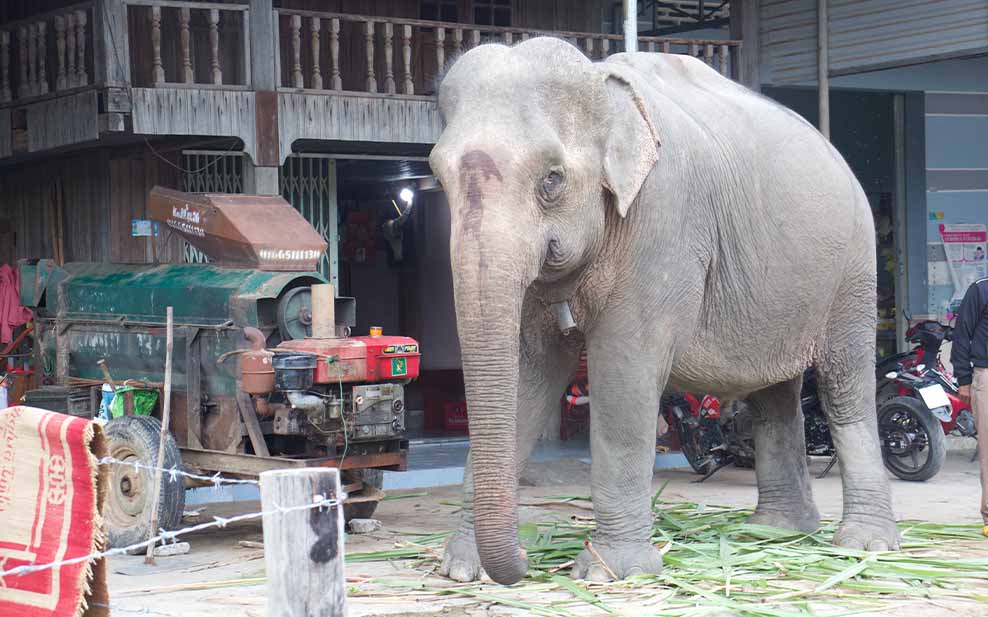
With the end of the bear bile trade and the cat and dog meat trade edging closer to reality, Animals Asia is now expanding into other areas. Two years ago, they started a new programme in Vietnam to rescue captive elephants from the logging and tourism industries. Since then, 13 elephants have been rescued and Animals Asia has signed a legally binding agreement with the government of Vietnam’s Dak Lak Province to end elephant riding. Better still, unlike the bears, the elephants can be released to the wild and are currently living happily in Yok Don National Park.
As the founder of Animals Asia, it would be easy to credit all of these achievements to Jill herself. But she dismisses that notion, instead crediting all those who have helped her over the years from governments to vets to animal handlers to worldwide staff. “I don’t think any one person can talk like that, because you rely on a great many people” she says on having an impact as an individual. In the face of a sometimes deeply sobering task, it is these accomplishments –and the potential to accomplish more like them– that really drive her.
“We’re just seeing so many new opportunities and so many campaigns that have been achieved in a positive way. We know that Animals Asia is doing remarkable things in the field for both captive and wild animals” she states. “That’s what gets me out of bed in the morning. It’s that pride that we’re keeping our promise to the animals.”
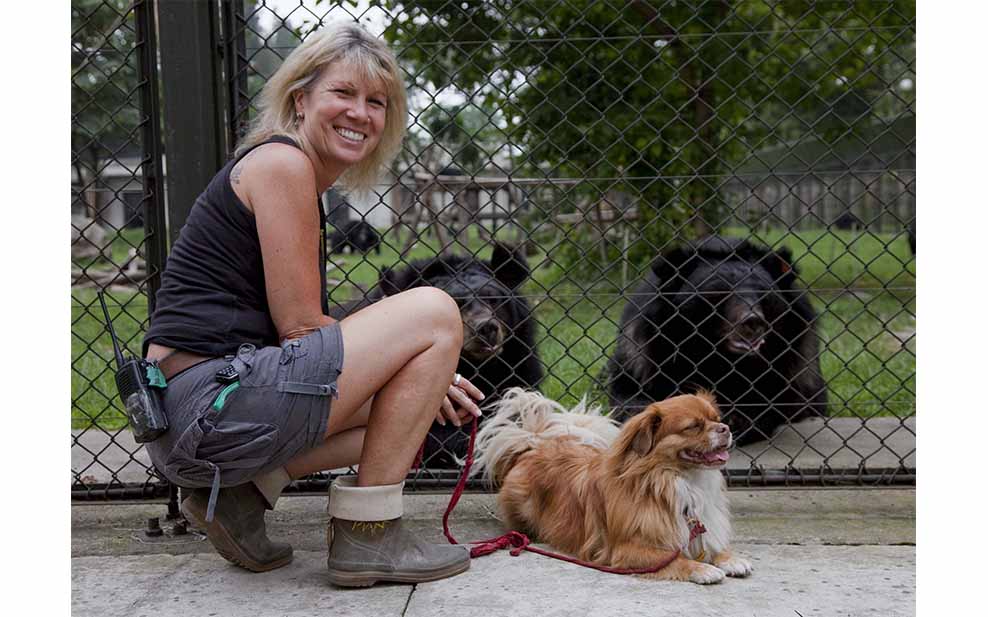
All in all, Jill Robinson is proof of the power of determined altruism: a desire to do good for others no matter the difficulties involved. In doing so, she has not only made better lives for the individual bears, cats, dogs and elephants of Asia, but has also made a kinder world for them by changing the hearts and minds of the people they share it with. We hope her story inspires others to seek out opportunities to do good for those who need it. You never know, your actions may just end up changing the world.
Before you go:
Animals Asia urgently needs funds for its second Vietnamese bear sanctuary. Finishing construction on time is crucial, as unless the bears have somewhere to go once the farms close, they cannot be rescued. Your support will help to fund bear enclosures, a hospital, a quarantine centre and staff quarters.
If you are able to donate, please consider checking out their donation page: https://www.animalsasia.org/hk-en/donate/
Finally, here are a few quickfire questions and answers to help you get to know Jill better. We asked her to say the first thing that came to mind when we said the following words. Her responses are in italics.
- Bears: Respect
- Bear Bile: Replaceable
- Dogs: Best Friends
- Animals Asia: Kindness
- Hong Kong: Home
- Vietnam: Fascinating
- Animal Welfare: Essential
- Purpose: Never Forgotten
- Hope: Eternal
- Future: Achieving Goals
Written exclusively for WELL, Magazine Asia by Thomas Gomersall
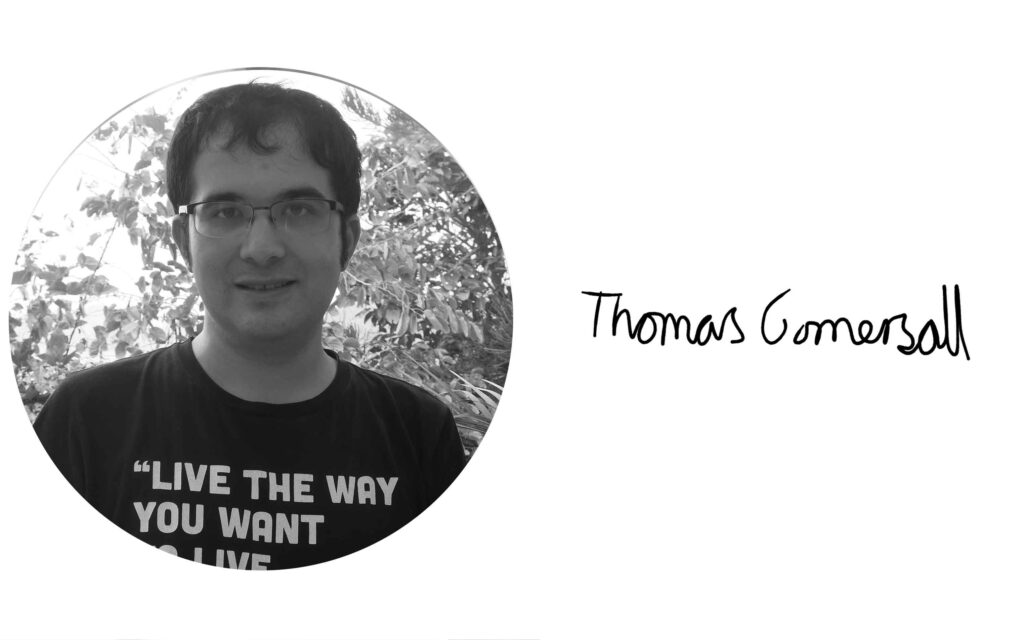
Thank you for reading this article from WELL, Magazine Asia. #LifeUnfiltered.
Connect with us on social media for daily news, competitions, and more.
